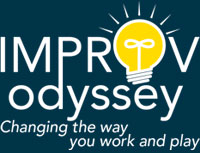Does Teaching mean you have to be Mean?
Michael wrote as a comment to me regarding another post: Is it my imagination or did a lot of the famous improv teachers yell at their students? Sounds like Viola did. People said Del Close was often a huge dick to his students. Keith Johnstone was famous for calling a student’s work horrible and telling.. read more →
The Power of Play and the Need for Playing
Play creates happy emotional condition of the organism-as-a-whole. Play involves social values, as does no other behavior. The spirit of play develops social adaptability, ethics, mental and emotional control, and imagination. These are the more complex adjustments a child learns through play. In play, there are adjustments to new situations constantly. Play experience can prepare.. read more →
A Question of Evaluating Students
I recently got a letter from a teacher who uses Spolin Games in the classroom. She asked an interesting question: …Here’s my question: what theatre game would you recommend I use in evaluating the ability level or strength of a 4-6 grader performing improvisation? In other words, which game might let me know which student.. read more →
NO FAIL NO FEAR
“I don’t believe in success and failure.” – Viola Spolin. We all approach new things with some trepidation. I’ve been told by new students that they are there in the workshop because Improv terrifies them and they want to face that fear. Bravo to them for their courage, but ‘sheesh!” I tell them that they.. read more →
How to Leave Your Ego at the Door
“Enough about me… What do you think about me?” Making Your Partner Look Good “Make your partner look good!” is a coach used in current improvisational training. The reason this coach is valuable is because it is based on the idea that there is more opportunity for good improv by being more concerned with your.. read more →
Why Freeze Tag is the Anti-Improv Game
“The heart of improvisation is transformation” – Viola Spolin Playwriting: Manipulation of situation and fellow actors; an unwillingness to believe that a scene will evolve out of the group playing; not understanding the focus; deliberately using old action, dialogue, information, and facts (ad-libbing) instead of spontaneous selection during improvisation; not usable in impeovisational theater. “Stop playwriting!” — Improvisation.. read more →
What Does it Mean to Improvise?
“Creativity is not the clever rearranging of the known.” – Viola Spolin Creativity is a state that allows us to touch the unknown and to bring it into the phenomenal world: To make the invisible visible. The unknown is a territory that holds all possibilities, until it is revealed. The act of revealing – that is.. read more →
The Art of Sidecoaching
The most subtle and essential element in Spolin Games is sidecoaching. The sidecoach is at once a fellow player, a grounded teacher and a canny director. Sidecoaching is as much a skill as it is an art. It therefore requires the same intuitive ability evoked by playing. In addition, the sidecoach has to also be.. read more →
The Genius of Preoccupation
Spolin’s pathway to the Unknown The [Spolin’s Theater Games] exercises are artifices against artificiality, structures designed to almost fool spontaneity into being–or perhaps a frame carefully built to keep out interferences in which the player waits. Important in the game is the ‘ball’ — the FOCUS, a technical problem, sometimes a double technical problem which.. read more →
A Sense of Urgency
Using Slow Motion to counteract Urgency This happened to me in an early workshop with Viola when we were working on The Where: The scene is a spaceship. I’m the navigator. Andy is the captain, and we have two prisoners from another planet on board. I sit placidly at my controls downstage. The captain yells.. read more →










